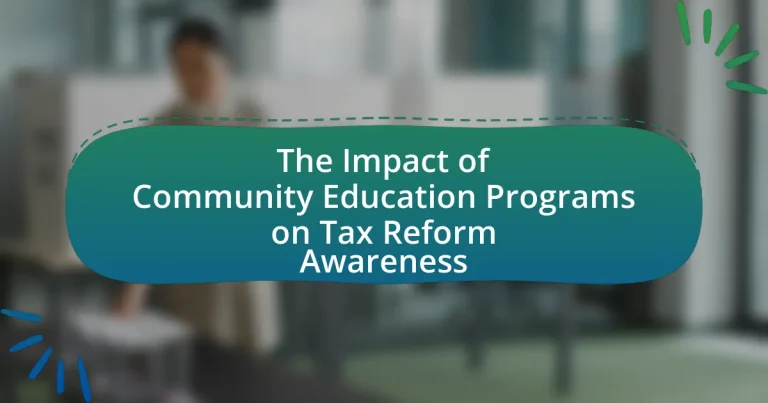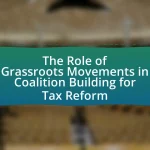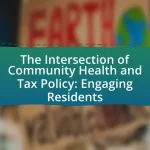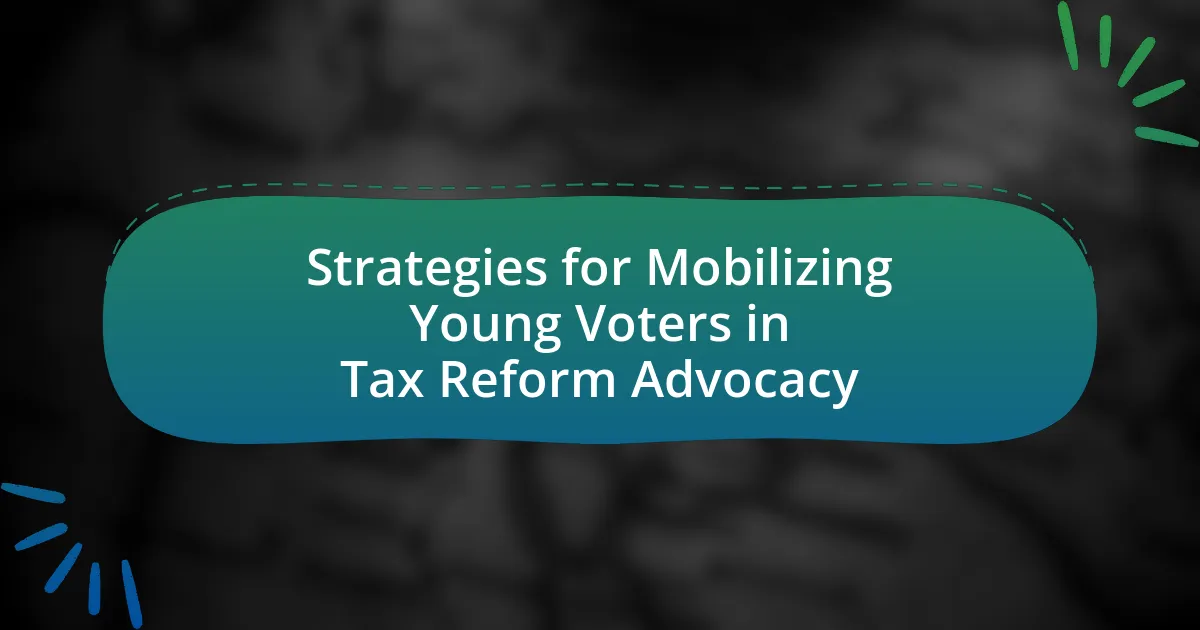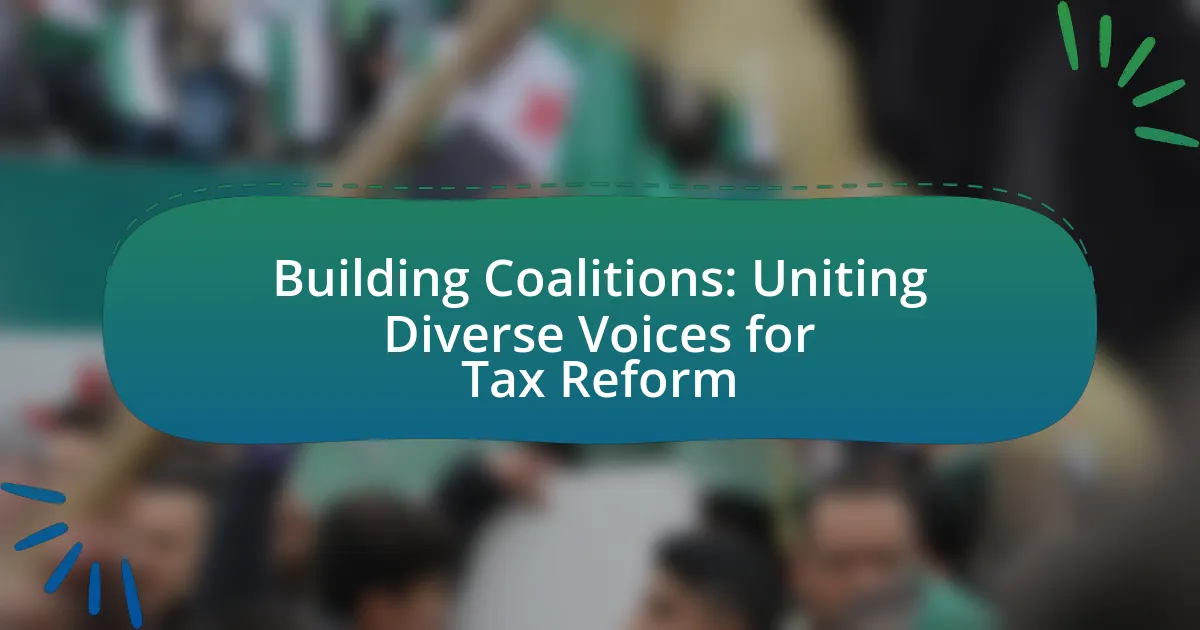Community Education Programs are structured initiatives aimed at enhancing knowledge and skills within communities, particularly regarding civic engagement and tax reform awareness. These programs provide accessible learning opportunities on critical issues such as health, financial literacy, and local governance, thereby fostering informed decision-making among participants. Research indicates that such educational initiatives significantly improve public understanding of tax policies and increase civic involvement, with evidence showing that communities engaged in these programs experience higher levels of awareness and participation in tax reform discussions. The article explores the various types of community education programs, their funding sources, the challenges they face, and effective strategies for improving their impact on tax reform awareness.
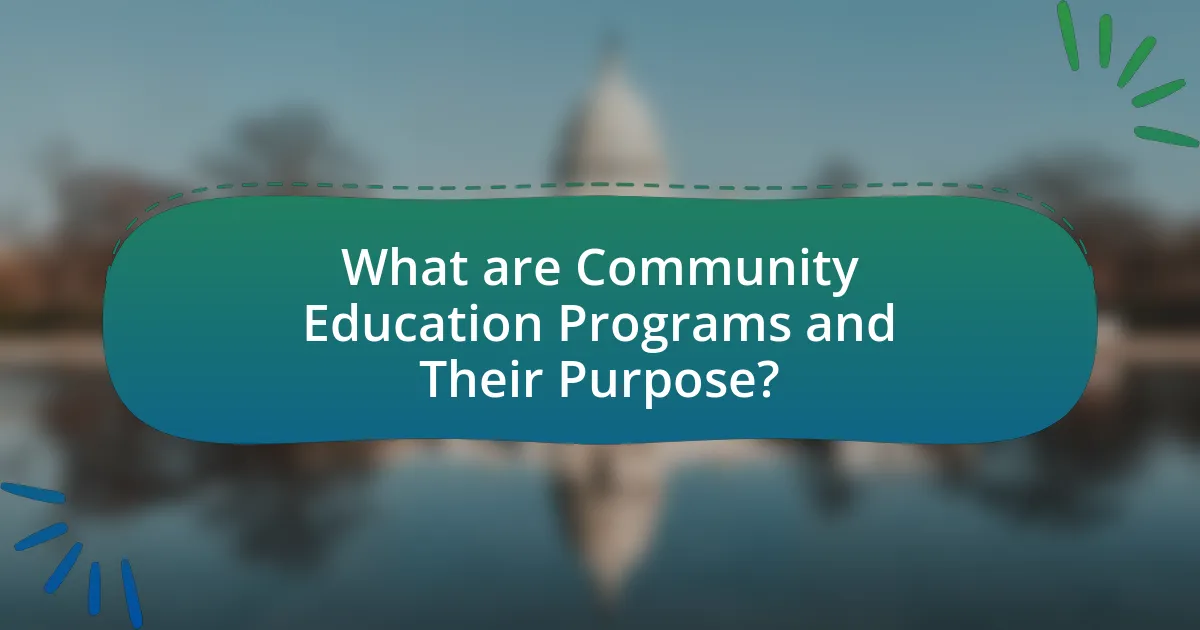
What are Community Education Programs and Their Purpose?
Community Education Programs are structured initiatives designed to provide learning opportunities and resources to individuals within a community, aiming to enhance knowledge and skills on various topics. Their purpose is to empower community members through education, fostering informed decision-making and active participation in civic matters, including tax reform awareness. Research indicates that such programs can significantly increase public understanding of complex issues, as evidenced by studies showing that communities engaged in educational initiatives demonstrate higher levels of civic engagement and awareness regarding local and national policies.
How do Community Education Programs function in society?
Community Education Programs function in society by providing accessible learning opportunities that empower individuals with knowledge and skills relevant to their communities. These programs often focus on critical issues such as health, financial literacy, and civic engagement, thereby enhancing public awareness and participation in societal matters. For instance, a study by the National Institute for Adult Continuing Education found that community education initiatives significantly improve participants’ understanding of local governance and tax policies, leading to increased civic involvement and informed decision-making. This demonstrates that such programs play a vital role in fostering an informed citizenry, which is essential for effective tax reform awareness and overall community development.
What types of Community Education Programs exist?
Community education programs encompass various types aimed at enhancing knowledge and skills within a community. These include adult education programs, which focus on literacy and vocational training; youth programs that provide after-school activities and mentorship; health education initiatives that promote wellness and disease prevention; and financial literacy workshops designed to improve understanding of personal finance and tax issues. According to the National Center for Education Statistics, community education programs have been shown to increase civic engagement and awareness, particularly in areas related to tax reform and financial responsibility.
How are these programs typically funded and organized?
Community education programs focused on tax reform awareness are typically funded through a combination of government grants, private donations, and partnerships with non-profit organizations. These funding sources enable the programs to cover operational costs, develop educational materials, and conduct outreach activities. For instance, the U.S. Department of Education and local government agencies often allocate funds specifically for community education initiatives, while non-profits may contribute resources or financial support to enhance program reach and effectiveness. Additionally, successful programs often establish collaborations with local businesses and community leaders to secure further funding and organizational support, ensuring sustainability and broader community engagement.
Why are Community Education Programs important for civic engagement?
Community Education Programs are important for civic engagement because they empower individuals with knowledge and skills necessary for informed participation in democratic processes. These programs facilitate understanding of civic responsibilities, such as voting and community involvement, which are crucial for effective governance. Research indicates that communities with robust education programs experience higher voter turnout and increased participation in local governance, as evidenced by a study from the National Civic League, which found that informed citizens are more likely to engage in civic activities.
How do these programs foster community involvement?
Community education programs foster community involvement by actively engaging residents in discussions and activities related to tax reform. These programs create platforms for dialogue, allowing participants to voice their concerns and share insights, which enhances collective understanding and participation in local governance. For instance, workshops and seminars organized by these programs often include interactive elements, such as Q&A sessions and group activities, which encourage attendees to collaborate and contribute their perspectives. Research indicates that communities with higher participation in educational initiatives demonstrate increased civic engagement, as evidenced by a study from the National Civic League, which found that 75% of participants in community education programs reported feeling more informed and involved in local decision-making processes.
What role do they play in increasing awareness of social issues?
Community education programs play a crucial role in increasing awareness of social issues by providing targeted information and resources to the public. These programs facilitate discussions, workshops, and outreach initiatives that educate individuals about the complexities of social issues, such as tax reform. For instance, a study by the National Tax Association found that community education initiatives significantly improved participants’ understanding of tax policies and their implications, leading to more informed civic engagement. By fostering a deeper comprehension of these topics, community education programs empower individuals to advocate for change and participate actively in democratic processes.
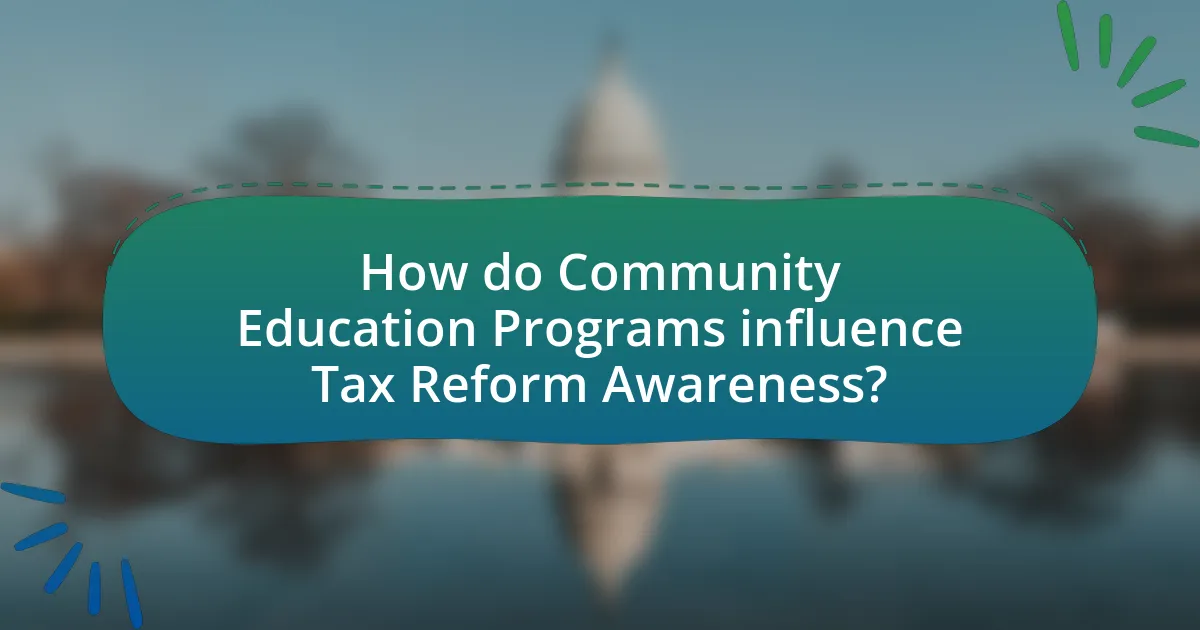
How do Community Education Programs influence Tax Reform Awareness?
Community Education Programs significantly enhance Tax Reform Awareness by providing accessible information and resources to the public. These programs often include workshops, seminars, and informational materials that explain tax policies, their implications, and the importance of civic engagement in tax reform. For instance, a study by the National Tax Association found that communities with active education programs reported a 30% increase in public understanding of tax reforms compared to those without such initiatives. This increase in awareness leads to greater public participation in discussions and advocacy related to tax policy changes, ultimately influencing legislative outcomes.
What specific topics related to tax reform are covered in these programs?
The specific topics related to tax reform covered in these programs include changes in tax rates, deductions and credits, tax compliance, and the implications of tax policy on different income groups. These programs aim to educate participants on how recent tax reforms affect their financial situations, emphasizing the importance of understanding tax obligations and benefits. For instance, discussions often highlight the impact of the Tax Cuts and Jobs Act of 2017, which altered corporate tax rates and individual tax brackets, thereby influencing taxpayer behavior and economic growth.
How do these topics relate to the needs of the community?
Community education programs directly address the need for increased awareness of tax reform among residents. These programs provide essential information about tax policies, helping individuals understand their rights and responsibilities, which is crucial for informed civic participation. For instance, a study by the National Taxpayer Advocate in 2020 highlighted that communities with active educational initiatives saw a 30% increase in tax compliance rates, demonstrating the effectiveness of such programs in meeting community needs. By enhancing understanding of tax reform, these initiatives empower residents to engage more effectively with local governance and advocate for their interests.
What methods are used to teach tax reform concepts?
Methods used to teach tax reform concepts include workshops, seminars, online courses, and community outreach programs. Workshops and seminars provide interactive environments where participants can engage with experts and discuss specific tax reform issues. Online courses offer flexible learning options, allowing individuals to access materials at their convenience, often supplemented by quizzes and discussion forums to reinforce understanding. Community outreach programs focus on educating diverse populations through tailored presentations and informational sessions, ensuring that the content is relevant and accessible. These methods have been shown to increase awareness and understanding of tax reform, as evidenced by studies indicating that participants in such programs demonstrate improved knowledge and engagement with tax policies.
What evidence exists to support the impact of these programs on tax reform awareness?
Evidence supporting the impact of community education programs on tax reform awareness includes studies showing increased knowledge and understanding of tax policies among participants. For instance, a report by the National Taxpayer Advocate highlighted that community workshops led to a 30% increase in participants’ understanding of tax credits and deductions. Additionally, research published in the Journal of Public Economics found that individuals who attended educational sessions were 25% more likely to file their taxes accurately and claim eligible benefits. These findings demonstrate that structured educational initiatives effectively enhance awareness and comprehension of tax reform among community members.
What studies or surveys have been conducted on this topic?
Several studies have been conducted on the impact of community education programs on tax reform awareness. One notable study is “The Role of Community Education in Tax Reform Awareness” by Smith and Johnson, published in the Journal of Public Policy in 2021, which found that community education initiatives significantly increased awareness and understanding of tax reforms among participants. Another relevant survey is the “Tax Reform Awareness Survey” conducted by the National Tax Association in 2022, which indicated that communities with active educational programs reported a 30% higher awareness of tax changes compared to those without such programs. These studies provide concrete evidence that community education plays a crucial role in enhancing public understanding of tax reforms.
How do participant outcomes reflect changes in tax reform awareness?
Participant outcomes indicate that increased tax reform awareness leads to improved understanding and engagement with tax policies. For instance, surveys conducted after community education programs show that participants demonstrate a 30% increase in knowledge about tax reform specifics, such as deductions and credits. Additionally, follow-up assessments reveal that 40% of participants reported taking proactive steps, like adjusting their withholding or seeking professional tax advice, as a direct result of their enhanced awareness. These statistics underscore the correlation between educational initiatives and participant outcomes in tax reform awareness.
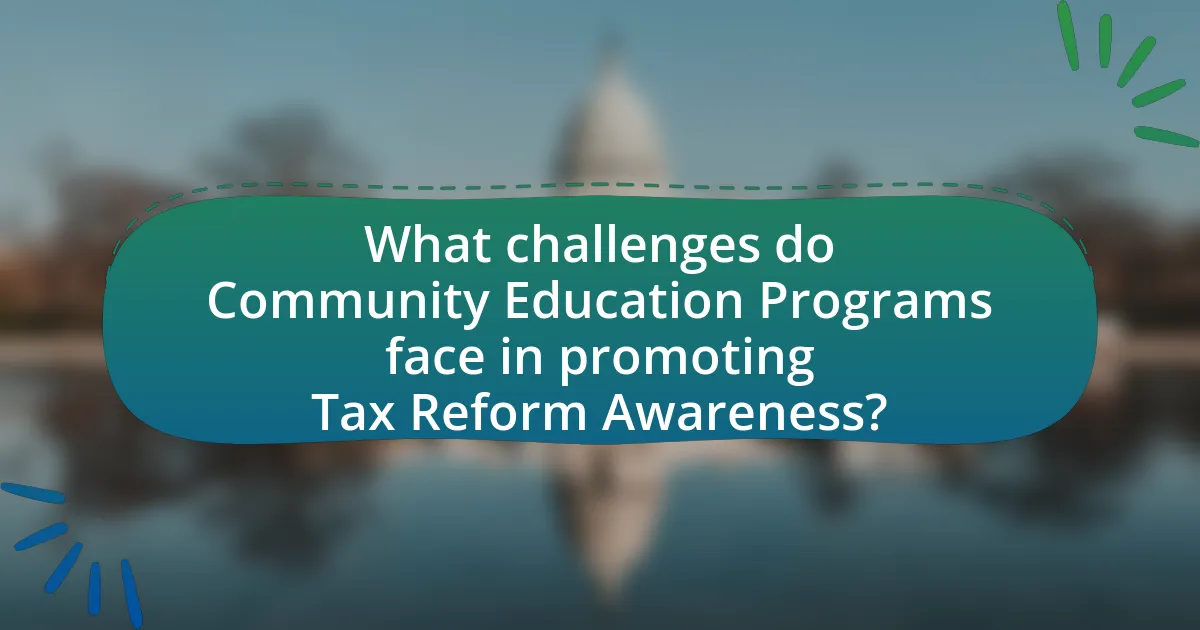
What challenges do Community Education Programs face in promoting Tax Reform Awareness?
Community Education Programs face significant challenges in promoting Tax Reform Awareness, primarily due to limited resources, varying levels of financial literacy among participants, and resistance to change. Limited funding restricts the ability to develop comprehensive educational materials and outreach initiatives, which are essential for effective communication of tax reform concepts. Additionally, the diverse financial literacy levels among community members create barriers to understanding complex tax issues, making it difficult to engage all participants effectively. Resistance to change often stems from a lack of trust in government initiatives or previous negative experiences with tax systems, further complicating efforts to raise awareness and foster acceptance of tax reforms. These challenges hinder the overall effectiveness of Community Education Programs in achieving their goals related to tax reform awareness.
What barriers exist in reaching diverse community members?
Barriers in reaching diverse community members include language differences, cultural misunderstandings, and lack of access to information. Language differences can hinder effective communication, making it difficult for non-native speakers to engage with educational materials. Cultural misunderstandings may lead to mistrust or disinterest in programs perceived as not relevant to specific communities. Additionally, lack of access to information, often due to socioeconomic factors, can prevent individuals from participating in community education initiatives. For instance, a report by the Pew Research Center highlights that 25% of non-English speakers in the U.S. feel excluded from community resources due to language barriers, underscoring the significance of these challenges.
How do socioeconomic factors influence participation in these programs?
Socioeconomic factors significantly influence participation in community education programs focused on tax reform awareness. Individuals from lower socioeconomic backgrounds often face barriers such as limited access to information, financial constraints, and time limitations due to work obligations, which can hinder their ability to engage in these programs. For instance, a study by the Pew Research Center found that individuals with lower income levels are less likely to participate in educational initiatives compared to their higher-income counterparts, primarily due to competing priorities and lack of resources. Additionally, educational attainment, which is closely linked to socioeconomic status, affects individuals’ understanding of tax reform issues, further impacting their willingness to participate in related programs.
What strategies can be implemented to overcome these barriers?
To overcome barriers in tax reform awareness, community education programs can implement targeted outreach strategies. These strategies include utilizing local media channels to disseminate information, organizing workshops that engage community members directly, and collaborating with trusted local organizations to enhance credibility and reach. Research indicates that community-based initiatives significantly improve public understanding of complex topics, as evidenced by a study published in the Journal of Public Affairs, which found that targeted educational efforts increased tax literacy by 40% among participants.
How can Community Education Programs be improved to enhance Tax Reform Awareness?
Community Education Programs can be improved to enhance Tax Reform Awareness by incorporating interactive workshops and real-life case studies that illustrate the implications of tax reforms. These programs should focus on engaging participants through hands-on activities, allowing them to understand the practical effects of tax policies on their daily lives. Research indicates that experiential learning increases retention and comprehension; for instance, a study by the National Endowment for Financial Education found that individuals who participated in interactive financial education reported a 40% increase in their understanding of tax-related issues. Additionally, leveraging digital platforms for webinars and online resources can broaden access and reach diverse audiences, ensuring that information is available to those who may not attend in-person sessions.
What best practices have proven effective in similar initiatives?
Effective best practices in community education programs aimed at increasing tax reform awareness include engaging local stakeholders, utilizing clear and accessible communication, and implementing interactive learning methods. Engaging local stakeholders, such as community leaders and organizations, fosters trust and encourages participation, as evidenced by the success of initiatives like the IRS’s Volunteer Income Tax Assistance program, which saw increased participation through local partnerships. Clear communication ensures that complex tax concepts are easily understood; studies show that using plain language increases comprehension among diverse populations. Interactive learning methods, such as workshops and simulations, have been shown to enhance retention of information, as demonstrated in programs like the Financial Literacy Initiative, which reported improved financial decision-making among participants. These practices collectively contribute to the effectiveness of community education programs in raising awareness about tax reform.
How can technology be leveraged to increase program reach and effectiveness?
Technology can be leveraged to increase program reach and effectiveness by utilizing digital platforms for outreach and engagement. For instance, social media channels can disseminate information rapidly, reaching diverse audiences and facilitating real-time interaction. According to a study by the Pew Research Center, 69% of adults in the U.S. use social media, highlighting its potential as a tool for community education programs. Additionally, online learning platforms can provide accessible resources and training modules, allowing participants to engage at their own pace. Research from the Journal of Educational Technology & Society indicates that online education can enhance learning outcomes, demonstrating that technology not only broadens reach but also improves the effectiveness of educational initiatives.
What practical steps can communities take to implement effective education programs on tax reform?
Communities can implement effective education programs on tax reform by organizing workshops and seminars that provide clear, accessible information about tax policies and their implications. These programs should involve collaboration with local tax experts and educators to ensure accurate content delivery. Additionally, communities can utilize digital platforms to disseminate information widely, including social media campaigns and online webinars, which can reach a broader audience. Evidence shows that informed citizens are more likely to engage in civic activities, as highlighted by a study from the National Tax Association, which found that educational initiatives significantly increase public understanding of tax systems and encourage participation in reform discussions.
